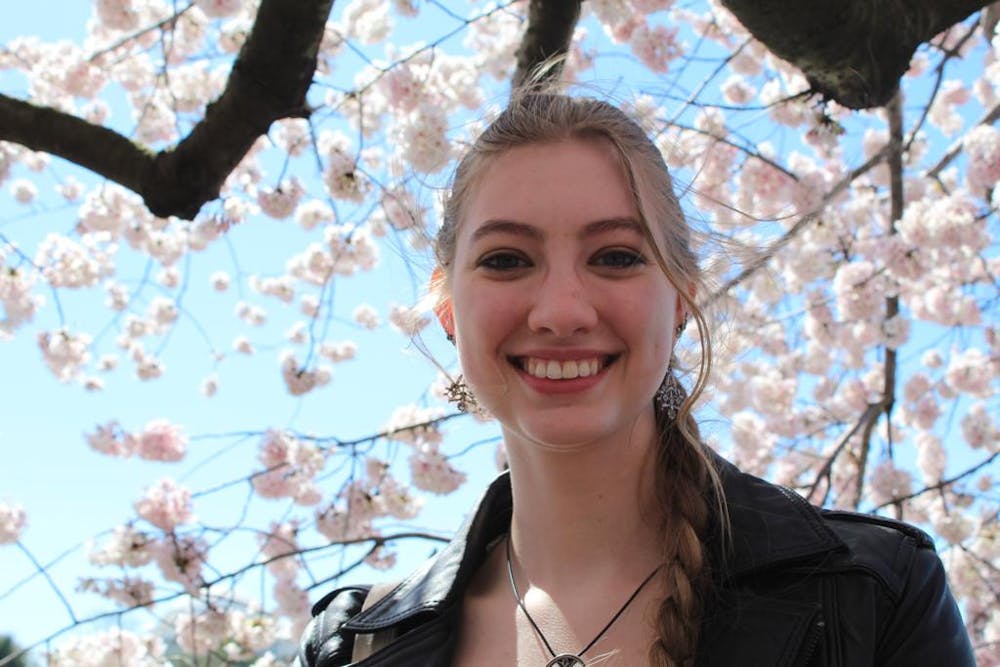Katherine Budinger, a sophomore majoring in Writing Seminars and English, is currently conducting a research project connecting Dante Alighieri's narrative poem The Divine Comedy with tarot card meaning and symbolism. In an interview with The News-Letter, she discussed her interest in humanities research, working with the Sheridan Special Collections and the connections she found between Dante and astrology.
The News-Letter: What inspired your research with Dante and tarot cards?
Katherine Budinger: I stumbled across tarot cards as a writing prompt exercise in high school, and I thought they seemed neat and kind of witchy. I picked up a deck of tarot cards, and it was so interesting; there’s so much symbology throughout the history of Tarot practices. There have been so many different twists and turns, and they've been used for so many different purposes. It started with me being very captured by the imagery and the meaning that is imbued in the different symbols.
I took a class on Dante last semester, and for my final project, I wanted to create a tarot deck inspired by The Divine Comedy, which we had just read and analyzed. It spiraled into doing more research into the actual history of Tarot and how it evolved from 15th century Milan through the 19th century occult movement into where it is today — a sort of spiritualism thing.
N-L: What was a challenge when creating this project?
KB: One of the big complications that we ran into is the fact that in Inferno, in the eighth circle of hell, are the Diviners. I had to think whether I could really interpret Dante through the lens of something that was used as and still used for fortune telling when the fortune tellers are in hell. It was a little tricky to navigate.
Tarot origins are very mysterious, and throughout their scholarship, lots of different origins have been assigned. We do know for a fact that the oldest identified tarot cards are from 1450 and painted in Milan, and they were used as a card game called Tarocchi. It didn't have to do with anything esoteric. It was just like playing a game like Go Fish, except the cards had beautiful imagery, and they could pack a lot of meaning.
The decks have also been linked to Petrarch’s poems, which actually links back to Dante because Petrarch's Triumphs were inspired in part by [Dante’s] The Divine Comedy. It creates a little bit of a line from Dante to Petrarch to early Tarot, which is really cool and interesting.
There's a new modernist Tarot movement that's using [Tarot] as self-reflection and interpreting your own personality, as opposed to trying to predict your future, which is a little bit like what Dante himself does with astrology. In certain moments in The Divine Comedy, Dante makes a couple of references to the poem and he's like, “I'm in Gemini, and this is why I'm like this.” I’m looking into how perceptions of [Tarot] have changed throughout history, and how they play into each other.
N-L: What are you currently working on right now?
KB: I’m presenting at two conferences: one is the Yale Undergraduate Research Symposium, and then, at the end of April, Hopkins is hosting the Dante Society of America, and I will have a poster there. I’m looking at three or four core elements, including the history of Tarot and the symbolic overlap between images and Dante. The Wheel of Fortune is a really obvious connection. Dante talks a lot about fortune and her wheel and that is one of the early Tarocchi cards.
I’m working on grappling with how Dante would interpret the Tarot and how he would even feel about the fact that I'm even doing all of this given the context of Inferno. Eventually, the next step is continuing to formulate a new tarot deck that pairs quotes and characters from The Divine Comedy with the standard tarot card deck and reading it in a way that is not necessarily focused on the future and prophecy, but rather more focused on interpreting the self, like how they would use astrology in the Middle Ages.
N-L: What's something in the Special Collections that you think is really cool that other Hopkins people probably wouldn't have heard of?
KB: I’m a big Oscar Wilde fan, and we have a first-edition Dorian Gray that I am in love with. It's probably my favorite thing in the collection. We also have this really interesting early Dante manuscript with little wood-cut engravings. One of the things I love about our Special Collections, specifically, is that if you’re an [undergraduate] doing research, they’re like “Come in and look at what we have.” They're not trying to gatekeep anything.
N-L: How do you keep the material safe from getting damaged when you are conducting research?
KB: It's very much being considerate with whatever you're working with and remembering that this is hundreds of years old sometimes. Our conservation department is really great about making sure that everything is stored properly.
What surprised me the most when I started working there is that you have to be careful and considerate, but it's still a book, and it's meant to be read. It's meant to be looked at. We don't wear gloves for most things, as you see on TV where it's climate-controlled and maximum security. It's mostly just about being gentle and considerate of the artifacts you're working with.
N-L: If you could design a tarot card to represent yourself, what would it look like?
KB: There are actually some more modern tarot decks out there that actually redesigned the traditional cards. Something I actually contemplated doing for this project was completely redesigning the traditional arcana. For myself, I would probably go with something slightly boring, along the lines of the Magician because it's my favorite card, but making it more themed to reading and writing. Maybe calling it the scholar, like someone working in a library with a fancy pen.





